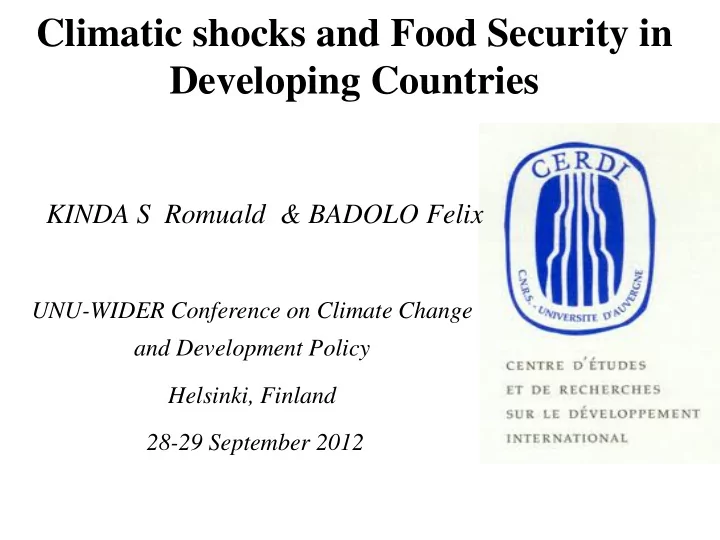

Climatic shocks and Food Security in Developing Countries KINDA S Romuald & BADOLO Felix UNU-WIDER Conference on Climate Change and Development Policy Helsinki, Finland 28-29 September 2012
Outline • Objective & Motivation • Literature Review Determinants of food security Effects of climatic shocks on Food Security • Empirical analysis • Conclusion
Objective The paper aims: To analyze the effects of climatic shocks on food security (Food supply, undernourished population) Identify mechanisms • We use aggregated panel data over 1960-2008 for 77 developing countries • We apply modern econometric methods
Motivations Regain and importance of the climate change debate MDGs: ( Goal 1: MDG Report(2011), Chen et Ravallion (2010), FAO, (2009a)) Prev studies (Climate change and Agr) are: theoretical papers (Christensen et al. (2007), Ringler, Zhu, et al.(2010) Few Empirical papers ( Lee, Nadolnyak, et Hartarska 2012, von Braun (1991)
Originality : empirical and macroeconomic: 77 developing countries mechanisms climatic shocks food security Climatic variability data from 2 sources
Literature review (1) Determinants of food security Definition of food security (FAO 1996) “when all people, at all times, have physical and economic access to sufficient, safe and nutritious food to meet their dietary needs and food preferences for an active and healthy life”. Microeconomic Causes -Low rate of agricultural production (FAO, 2004) -Low access to food supply -infrastructures and local markets -environment health
Literature review (2) Macroeconomic Causes -Economic performance ( Pritchett & Summers,1996 Wiesmann, 2006) - Population growth ( Birdsall & Sinding (2001) -Trade policy (Merrick (2002) -Political institutions (Sen (1999), Sen (2000); Wiesmann (2006)) Effects of climatic shocks on Food Security Effect on Agriculture Production ( Dorward and Kydd (2002))
Literature review (3) Effect on Households incomes ( ILO (2007)) Effect on food prices (food avaibility and accessibility) Effect on economic growth and resources ( Dell and al. (2008)) Effect on the risk of civil conflicts
Empirical analysis (1) Analyze effects of climatic shocks on food security Estimation method With X :{ income pc, rainfall, pop growth, democratic institutions}, error term, time effect and country fix- effects. : two complem measures food security
Empirical analysis (2) - Food supply - Proportion of undernourished population :rainfall instability Heterogeneities between CS and food security: the impact conditional on the civil conflicts climatic vulnerability of countries A context of food prices vulnerability Estimation strategy : OLS, FE and RE
Empirical analysis (3) Sources -World Development Indicators (2011): pop growth, income pc, undernourished people - Democratic institutions (Polity IV (2010)), civil conflicts (M.G. Marshall (2010)), climatic vulnerability (D Wheeler (2011)) - Rainfall volatility (Guillaumont and Simonet (2011)) and food supply (FAOSTAT (2011): wheat, rice, maize, sorghum, soybean, sugar)
Empirical analysis (4) Rainfall volatility reduces food supply in DC: Why ? High incertitude agr production & Households incomes Low Ec growth & ability to purchase food on international markets (food import) Results are robust with additional control variables
Empirical analysis (5) Heterogeneity on the effect of climatic shocks The effects of rainfall shocks on food security are different for countries in conflict? Civil conflict reduce food supply (through active pop in agr sector)
Empirical analysis (6) • Effects of climatic shocks on food supply are more severe with civil conflicts.
Empirical analysis (8) Empirical analysis (8) The sec hyp tested is potential effect clim shocks in a context of food prices shocks vulnerability We construct this variable using the procedure de Janvry and Sadoulet (2008); Combes et al. (2012). Countries are vuln to food price shocks if : (1) high food dependency (2) a high food import burden (3) low income
Empirical analysis (8) • Countries that are more vulnerable to food prices shocks are less able to maintain food supply. • Very little policy space, limited fiscal and administrative capacity Robustness Alternative indicators of climatic shocks Rainfall series from Mitchell et al (2004) Rainfall inst is the abs deviation of the yearly
Empirical analysis (9) average of rainfall from its own trend (long term mean of rainfall 1960-2008): deterministic trend Hyp: stochastic trend. We compute and rainfall volatility defined as the 5-year rolling standard deviation of the growth rate of rainfall series
Empirical analysis (10) Inertia of food supply : lagged level of food supply) system-GMM estimation (one step and two steps Complementary indicator of food security proportion of undernourished people in the total population
Empirical analysis (11) • Food supply is transmission channel ?
Empirical analysis (12) climatic shocks increase malnutrition through food supply Heterogeneity for African countries
Conclusion (1) Clim shocks have neg effects on food security: They reduce food supply in DC ( SSA) Food supply is a channel by which climatic shocks increase undernourished people Neg effects are exacerbated in presence of civil conflicts effects are high for countries that vulnerable to food prices shocks.
Conclusion (2) Policies recommendation: One of them is the diversification of economies that are less reliant on agriculture. These countries should adopt agric techniques that optimize water use through increased and improved irrigation systems and crop development . “climatic aid” : government budget or development projects for the regions adversely affected by climatic shocks
Recommend
More recommend